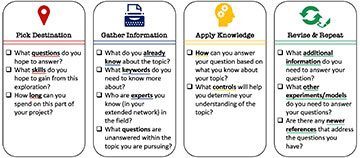
Atrouli Chatterjee
Whether you are starting your first foray into optics or asking new questions about a subject you have been pursuing for years, at some point you will probably come to a scientific intersection—a time when you need to learn a new discipline or breach a new topic. As someone who has traversed multiple fields over the last 10 years, I can offer some insight into the ways in which I have navigated new fields by learning their “customs” and “culture.”
In general, learning a new topic requires four simple steps—and a whole lot of time!
Pick a topic
First, you will need to choose a topic. If we imagine this trajectory as a geographical journey, then selecting a new subject is like picking the destination for your next trip.
Typically, my decision to pursue a new topic has started from talks I have heard or papers I have read on related fields, which have led me to ask, can I apply a similar approach to my project? For example, while taking a class on fluorescence microscopy techniques during my Ph.D., I was able to speak to an expert on microscopy and learn about integrating sphere spectroscopy, which is typically used to evaluate light scattering from films or powders used in coatings. Instead, I was able to apply it to cells and evaluate whether the engineered cells could alter their ability to scatter light after chemical stimulation.
Gather information
Second, you will need to gather information and references regarding your topic of interest, which is like perusing your favorite website or guidebooks for places you want to visit on your trip.
Like any other part of doing science, gathering information requires both a significant amount of reading (papers, reviews, books, patents) as well as discussion (speaking to an expert in the field, listening to talks and asking questions, talking to colleagues). Whenever I try to learn about a new field, I tend to start with a very basic overview, just to get a feel for what I know and what I really need to brush up on or learn.
Whenever I try to learn about a new field, I tend to start with a very basic overview, just to get a feel for what I know and what I really need to brush up on or learn.
I then try to explain what I have learned to someone else, whether a novice or expert in the field, which really opens myself up to the questions I had forgotten to ask or not thought of asking, and helps me refine my understanding of the topic. These discussions also help me pick up the “language” or jargon used in the field and enhances my ability to communicate with experts.
Apply your knowledge
Third, you will need to put what you have learned so far into practice and apply your knowledge—or in our analogy, you are finally at your destination and get to explore all of the places you have been reading about and scrolling through pictures of.
It is one thing to read papers and hear about the exciting work that others have done, and an entirely different can of worms to actually start putting those words into practice yourself. For example, although I have applied pre-built and commercial interference microscopy and holotomography systems to address biological questions, I only recently started to build a physical interferometer based on pre-existing designs.
While the ray diagrams looked straightforward on paper, adding the third dimension and building a system myself has been much trickier than I anticipated. Nevertheless, by experiencing firsthand the “culture” of the field, I can now grasp ray diagrams as more than just a schematic and at least have some understanding of the assembly process.
Revise and Repeat
Finally, you will likely need to re-evaluate step three based on step two—gather more information, then apply your new findings and make changes to your plans. Step four will continue until you have answered all of your questions and are ready to move on to a new topic of exploration or possibly decide to call your destination your new “second home.”
In general, being able to really succeed at learning a new topic (and perhaps any endeavor) depends on your ability to self-reflect on what has or has not worked, why, and what you can do to address any issues you have observed. Going back to my efforts to build an interferometer, the physical assembly of the microscope has given me a new appreciation for the actual physics of what happens to a beam of light, how it travels, and how its interference lends itself to information regarding the fundamental properties of a material. Nevertheless, I still need to read more about the mathematics and physics of the process and keep practicing my ability to align and re-align my setup.
Ultimately, exploring a new topic not only offers answers to questions and perhaps an additional set of tools and skills—like a trip or vacation, it also broadens your network, experiences and perspective.

